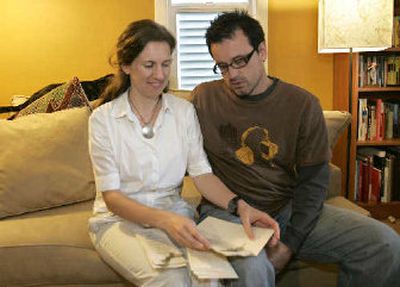A vow of charity

Jen Crane and Tom Frohlich are banking on the generosity of friends and family to collect as much money as possible when they get married — but not for selfish reasons.
In fact, the couple is quite embarrassed at the thought of receiving a bounty of traditional wedding gifts, be they large checks or fancy dishes. That is why they are instead encouraging guests to make donations in their honor to three charities: the Sierra Club, Girls on the Run and Youth in Focus.
Crane and Frohlich, who will exchange vows next month before 80 guests on Orcas Island off the north coast of Washington, are part of a tiny-but-growing group of couples turning their weddings into philanthropic opportunities. It is a trend that is picking up momentum, industry officials said, with help from a handful of Web-based nonprofits that serve as virtual intermediaries between couples, charities and guests.
While these decisions are largely a reflection of couples’ altruism and other personal values — Crane, for example, volunteers with the Sierra Club — many who are setting up charitable wedding registries acknowledge more practical motivations. For instance, as the average age of U.S. newlyweds rises and more couples live together before tying the knot, there is not as much need for cookware and other traditional gifts as in previous generations.
“We’re in our 30s, so it’s not like we need a lot of stuff,” said Crane, whose charitable wedding registry is managed by the I Do Foundation, a Washington, D.C.-based nonprofit that sends e-mails to guests informing them of the couple’s unorthodox request.
Of course, there are some things, like a new camping stove, that the couple would be happy to receive. And they know that certain guests, particularly older family members, will insist on buying a gift that can be wrapped and tied with a bow. For these reasons, Crane and Frohlich also set up a more traditional gift registry through the same foundation, though it requires participating retailers, such as REI and Linens ‘n Things, to give a small percentage of their sales to the charities the couple selected.
“We were looking for ways to cut back on the excess,” explained Crane, who like many brides-to-be these days was astounded by how quickly the costs of a wedding can escalate. “The whole wedding industry is a little bit out of control.”
Because weddings are increasingly secular “commercialized” events — Americans spend $26,000, on average — “people are looking for a way to reflect that they are deeper than all that,” said Carley Roney, co-founder of the wedding information portal The Knot Inc.
Some couples are making donations in honor of their guests instead of handing out party favors, while others are donating leftover food to nearby homeless shelters. “The wedding was originally a broader community celebration. You fed your entire village,” Roney said.